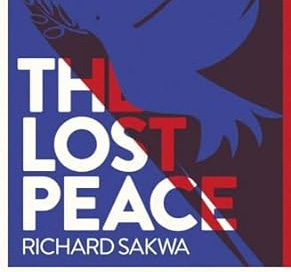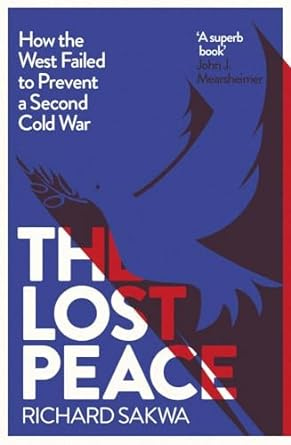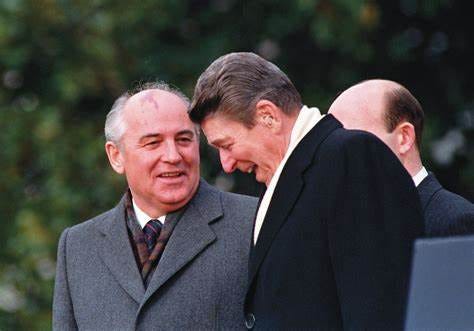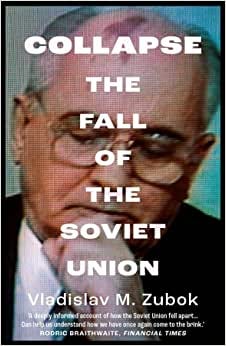Today is the second anniversary of the current conflict in Ukraine. Several important histories of this conflict and its causes have been published over the last year. One essential book that I recommend readers explore is Richard Sakwa, The Lost Peace: How the West Failed to Prevent a Second Cold War (2023).
I read Sakwa The Lost Peace recently, and it deepened my understanding of both the war, and my own response to the war. Sakwa’s view is that the failure to prevent a Second Cold War is tragic, and arguably has led to more catastrophic, tragic outcomes than the First Cold War.
unlike the earlier struggle, the Second Cold War in 2022 turned into a proxy war between Russia and the political West over Ukraine.
(Sakwa, The Lost Peace, p. 10)
It is estimated that there are more than 500,000, perhaps over 1,000,000 deaths now from this war. Moreover, this war carries with it the ever-present concern that it will spill over into World War III and nuclear annihilation. It has also had cultural diplomatic and economic consequences around the world.
And it did not need to happen; it arose from decisions by all sides, not just over the last three years, but over the last three decades. Sakwa writes
This is a story that begins in hope but ends in unmitigated tragedy, in both the classical and modern senses. There was a positive peace to be had after 1989 but it was squandered.
(Sakwa, The Lost Peace, p. 11)
Sakwa’s reference to 1989 is to the brief period between 1986 and 1990 when on the initiative of Mikhail Gorbachev and Ronald Reagan the two superpowers that had glowered at each other over the iron curtain of Eastern Europe abandoned their most hostile rhetoric and negotiated an end to the Cold War. Those negotiations led to significant nuclear disarmament agreements and the dissolution of the Warsaw Pact. Gorbachev hoped that NATO would do the same. He declared to the United Nations in 1988 that the Soviet Union would abandon the ideological foreign policies of the last 70 years, and implement active measures to de-militarise.
Underpinning his proposals was an assumption that one set of values cannot be shared by all in the world, and to force one set of values ultimately will lose the peace.
The de-ideologization of interstate relations has become a demand of the new stage. We are not giving up our convictions, philosophy, or traditions. Neither are we calling on anyone else to give up theirs. Yet we are not going to shut ourselves up within the range of our values. That would lead to spiritual impoverishment, for it would mean renouncing so powerful a source of development as sharing all the original things created independently by each nation. In the course of such sharing, each should prove the advantages of his own system, his own way of life and values, but not through words or propaganda alone, but through real deeds as well. That is, indeed, an honest struggle of ideology, but it must not be carried over into mutual relations between states. Otherwise we simply will not be able to solve a single world problem; arrange broad, mutually advantageous and equitable cooperation between peoples; manage rationally the achievements of the scientific and technical revolution; transform world economic relations; protect the environment; overcome underdevelopment; or put an end to hunger, disease, illiteracy, and other mass ills. Finally, in that case, we will not manage to eliminate the nuclear threat and militarism.
Mikhail Gorbachev, 1988 Speech to UN General Assembly
In his own country, Gorbachev brought glasnost, perestroika and a form of democracy to the Soviet Union. But his actions also destabilised the system, and ultimately contributed to the astonishing collapse of the Soviet Union in 1991.
In America, Ronald Reagan was succeeded by George H. W. Bush (the senior). Bush to some degree befriended and admired Gorbachev. But at the critical points when Gorbachev appealed for political and financial help to make the Soviet Union a “normal” country, Bush let his friend down. The story of the collapse of the Soviet Union is told brilliantly in Vladislav Zubok, Collapse: the Fall of the Soviet Union (2022). He writes in the elegiac conclusion of his brilliant book,
“There was no political will or imagination among Western leaders to seize the unprecedented and historic opportunity to consolidate democracy in Russia.”
(Zubok, Collapse, p. 433)
The books of both Zubok and Sakwa have helped me sort through my own memories, thoughts and emotions about this 35 year path from hope to tragedy. I recall those years of the late 1980s when Gorbachev gave hope to millions around the world that we did not have to live under the shadow of nuclear war. We did not have to define ourselves by loyalty to one or other super-power’s ideological rhetoric. We did not have to see the world through the distorted lens of Us vs Them.
I had no nostalgia for the Soviet Union, socialism or communism. For reasons I cannot account for I had since the mid-1970s read and been aware of the novels of Solzhenitsyn and the work of Soviet bloc dissidents like Vaclav Havel, Solidarity and Charter 77. It was not an ideological sadness that I felt when the Soviet Union fell, but a cultural connection that gave me an empathy for the peoples of the former Soviet Union and for Russian culture, history and literature. As the tragedy of the lost peace unfolded dramatically over the next 30 years, including through the social catastrophe of the 1990s in these states, I always felt these people do not deserve this and these events could have unfolded in a different way. My sentiments were reinforced over the years by travel to Russia, and reading and listening to their plural voices.
Richard Sakwa The Lost Peace gives precision and scholarship to those sentiments. Who is Richard Sakwa? Sakwa is a leading scholar of Russian and post-Soviet state politics. He is the Emeritus Professor of Russian and European Politics at the University of Kent, and has a distinguished publication record. His book Frontline Ukraine (2015) is essential reading to understand the background to the current conflict.
Unlike some historians, like Timothy Snyder and Serhi Plokhy, Sakwa does not champion the cause of any side in this war. He does not line up with the Ukraine cause. Nor is he a “Putin propagandist”, although that slur has been cast. He displays throughout The Lost Peace admirable objectivity and balance.
He focuses the story of the Lost Peace on two ideas of world order. On the one hand there is the Charter system, referring to the United Nations Charter of 1945, and, on the other hand, is the liberal universalist system, which refers to the idea of the “liberal rules-based order” supported by Western powers with growing passion since 1989. Sakwa expresses the essential tension between the two ideas so:
The Charter peace order is a moderated form of great-power politics, with the lexicon of the balance of power and spheres of interest tempered by commitment to multilateral cooperation. At its core is the notion of ‘charter liberalism’, based on a pluralist idea of the international community. Gerry Simpson describes it as a ‘procedure for organizing relations among diverse communities’. This stands in contrast to ‘liberal anti-pluralism’, described by Simpson as ‘a liberalism that can be exclusive and illiberal in its effects’, above all in its ‘lack of tolerance for non-liberal regimes’.
(Sakwa, The Lost Peace, p. 4)1.
Sakwa tells the story in three acts.
In Part 1 From Cold War to Hot War, he recounts the years hope when Gorbachev and many peace activists in the West thought there would be a ‘peace dividend’ at the end of the Cold War. He recalls the proposals Gorbachev and later both Yeltsin and Putin made and how they were responded to by the USA and the European Union. This story takes us through the growing conflict between the two ideas of world order, all the way to Russia’s proposals for a new European security framework in 2021. Real dialogue between the Charter and liberal universalist systems was never fully established, and this failure paved the road to the Ukraine war.
In Part Two, , Sakwa reviews the positions on the Ukraine War and the differing ideas of world order of the major powers in the World. He examines the challenge for America in defining a role of leadership, whether as primacy or some more modest aim as its relative weight in the world recedes. He examines China’s growing global role, and its increasingly assertive ideas of processes for peace and multilateral negotiation between states, including the Global South. He examines Russia, his deep speciality, and he examines the European Union.
In Part Three, War and International Politics, he examines the breakdown in arms control agreements between Russia and the USA, and the escalating tensions that preceded the War in Ukraine, first in 2014, and then with greater intensity from 2022. He condemns the war, and examines it in overview, rather than tactical detail, and focuses his analysis on the crisis of the international system, that conditioned the war and escalated after the war. Finally, he examines the rise of the what he calls, the “Political East”, looking in particular at how China, India and the Global SOuth have responded diplomatically to this conflict in ways the West did not expect, but that suggest more commitment to the process of peace embedded in the Charter system, rather than the ‘international liberal rules-based order’..
Sakwa concludes his book by writing:
The proximate cause of renewed cold war was the failure to create some sort of enduring and inclusive structure of European security. The Atlantic Powers did not set out deliberately to humiliate and marginalise the country, but there was no place for Russia in the new order. The slide into Cold War II thus became a tragedy in the classical sense, in which people of good intent become the victims of their own fate.
It is a sign of scholarly politeness that Sakwa refers to people of good intent. Many are less generous in interpreting the motives of American and Russian leaders. Undoubtedly, the belief in American supremacism and Russian resentment of the betrayal by America have both driven these tragic events. Together they have inflicted too much suffering on the rest of the world, all in the service of good causes. But Sakwa’s constraint aids understanding in a debate in which there is too little preparedness to listen to other points of view.
Ultimately, the diplomats and leaders of the world will need to find their way to some new compromise of the charter and liberal universalist ideas of world order. My money is on China, India, Russia and the rest winning many of the arguments over the decades ahead. We will need to learn to live in a world in which the West no longer calls the shots.
But if, like me, you are a mere citizen of this multipolar world, and have no real capacity to influence events, what do you do? Keep an open mind, explore the perspectives of the other parties, and read Richard Sakwa’s The Lost Peace. That way we may all together slowly rediscover the lost hope of peace.
Sakwa is referring to the international legal scholar, Gerry Simpson, ‘Two Liberalisms’, European Journal of International Law, 12/3, 2001, and indirectly to Isaiah Berlin’s discussion of two liberalisms, one pluralist and one more prone to crusades.





